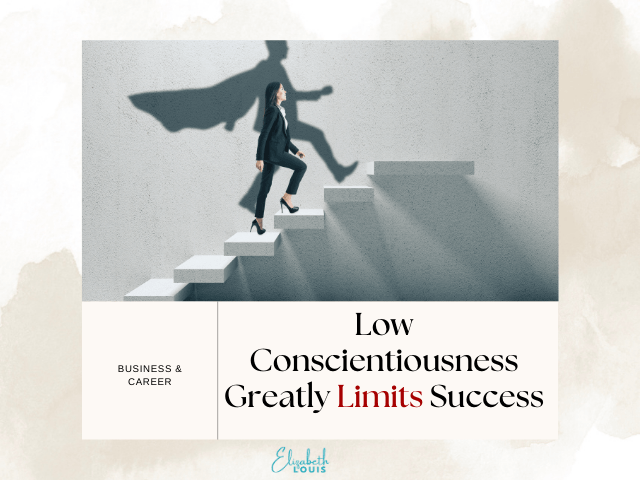
By: Elizabeth Louis
Most people don’t want to admit they are self-centered and have narcissistic-like tendencies. It’d be fair to say that selfishness and narcissistic tendencies are on a spectrum. To a degree, it’s human nature to be selfish, self-ambitious, and self-concerning. However, at some point, we must choose to grow up and humble ourselves if we want to be wise. Of course, that’s assuming one cares and values wisdom and growth.
Did you know a person with low conscientiousness is less likely to succeed in careers?
Of course, there’s the exception to the rule. There are plenty of financially successful people who have leveraged their selfishness, self-ambition, and lack of care for the well-being of others to get ahead. They make corrupt deals and many a times unethical decisions that solely benefit them. Therefore, we’d have to define what success is. To me, a successful person is defined more by their character than their bank account.
Characteristics of Low Conscientiousness:
Someone with a low conscientiousness can be narcissistic, psychopathic, or sociopathic. The individual is best described as a self-centered person who is motivated primarily by what he/she wants and what is good for him/her. An individual like this takes a rather casual approach to his or her commitments and obligations to others and lacks the dedication necessary for many undertakings.
Why does low conscientiousness limit success?
At a high level, it’s because such individual doesn’t have a strong sense of obligation or desire to keep his or her commitments. When comparing individuals with low conscientiousness to those with high conscientiousness, the latter are more selfless and willing to sacrifice their own needs for others.
Therefore, the individual is hard to trust and lacks integrity. Nine out of ten times this individual will prioritize his or her desires before others. In short, such an individual is not dependable and may prevent organizations from meeting the demands of his or her personal and professional responsibilities.
#1. We Need To People To Succeed.
For starters, most people do not enjoy being around a self-centered person who is primarily motivated by their wants and what is good for them. Plus, we need others to help us in life. Besides, business is made up of people, and if people don’t like you, it will be harder for you to grow and connect.
If this is you, I would highly encourage reading How to Win Friends and Influence People by Dale Carnegie to learn how to be an empathetic listener and how to make people feel fantastic!
#2. Your Word Means Crap!
When you have low conscientiousness, you are motivated by ME, MYSELF, & I! Therefore, being late doesn’t bother you because what you had to do was more important than keeping your word. This is dangerous because all you ever have is your word, and once that is gone, it’s nearly impossible to restore it.
Author Thomas J Stanley has spent years studying the self-made millionaire mindset. One of the things he learned from interviewing hundreds of self-made millionaires is that they consider their integrity to be one of their great assets. Many acknowledge their integrity is what got them to great success.
I highly encourage you to read THE MILLIONAIRE MIND if this is you.
#3. Undependable!
When someone is undependable, it’s harder to trust them. Would you trust someone who was undependable with your baby?
A lack of dependability can prevent you from meeting the demands of your career or social life. If you are a business owner, you may find it harder to keep your words to your customers. This is a HUGE issue because it’s easier to sell to someone who has already bought from you. Additionally, you may create more friction within the company’s organization. By not following through you impact other people in the organization from succeeding. Remember, humans are interconnected.
The bottom line is you can’t afford to be this way!
Here’s What To Do If You Suffer From Low Conscientiousness:
- Work on developing empathy. Hire a coach or a therapist to help you with this.
- Work on forgiving those who may have taken advantage of you, betrayed you, or hurt you when you were younger.
- Identify the rules you typically break or ignore. Work with your coach or therapist to help you better understand why rules are necessary and helpful.
If you have low conscientiousness and would like to work on this trait, I encourage you to apply to work with me. Schedule a consultation here.
Take the Performance Development Assessment
In the meantime, check out this episode on THE LIZ SHOW: The Potency of Empathy!
Check it Out on: Spotify | Apple Podcast | Direct Download
You got this. Keep up the good work. I believe GREATLY in you!
Liz



